What's New
Displaying results 4341 - 4350 of 4914
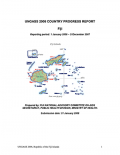
Resource | Publications,
Inclusiveness of the Stakeholders in the Report Writing Process - The compilation of this country report was done by a core group comprised of the NACA (National Advisory Committee on AIDS) Secretariat - MOH, technical advisers from the Secretariat of the Pacific Community and logistic facilitation from the UNAIDS office in Suva. The report process was preceded by a training on M&E, and establishment of the national M&E framework for the national HIV/AIDS strategies. The core group collected information through desk review, surveillance and survey reports, interviews with key persons, and a consultation workshop of NGOs where they focused on Part B of the NCPI1. The main stakeholders from government, civil society, and development agencies were brought together to review and endorse the UNGASS report in its entirety. Fiji’s Minister for Health, Women and Social Welfare was subsequently briefed and requested to sign the final document.
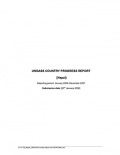
Resource | Publications,
The epidemic in Nepal is driven by injecting drug use and sexual transmission. There are numerous social, economical and cultural factors that drive the injecting and sexual behaviours among various most-at-risk groups. Given the nature of Nepal’s concentrated HIV epidemic the focus of the response has been maintained with prevention programmes targeting most-at-risk-populations. Over the period care, support and treatment programmes for People Living with HIV and AIDS has also expanded significantly.
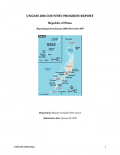
Resource | Publications,
This is an official submission to the UNAIDS secretariat for the monitoring of progress towards the Declaration of Commitment unanimously adopted in the 2001 UN General Assembly Special Session on HIV and AIDS. This report is presented exactly as submitted by the country, without editing or other alteration. This and other member state submissions will form the basis of the Secretary-General’s report to the General Assembly in June as well as the 2008 Report on the Global AIDS Epidemic which will be launched at the International AIDS Conference in August 2008.
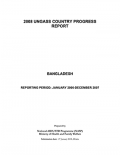
Resource | Publications,
The UNGASS reporting process included a desk review of reports and data relating to the HIV/AIDS situation in Bangladesh; the identification of stakeholders and their various contributions to the reporting process; a review of other data needs for the report; development of a plan for information collection; and the development of tools for data collection. These initial steps and the collation and analysis of data were undertaken by the National STD/AIDS Programme (NASP) of the Ministry of Health in coordination with partner organizations. Many stakeholders, including representatives of other government agencies, civil society organisations, people living with HIV, and UN agencies and other development partners, were involved in the reporting process.
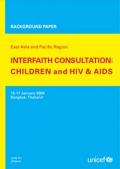
Resource | Publications,
The East Asia and Pacific region has not been spared from the ravages of HIV and AIDS. In 2007 in Asia there were an estimated 4.9 million people living with HIV (PLHIV), including 440,000 people who became newly infected in the past year; approximately 300,000 died from AIDS-related illnesses. Also in the same year, East Asia had an estimated 800,000 adults and children living with HIV, 92,000 adults and children newly infected with HIV, and 32,000 adult and child deaths from AIDS.
In responding to the needs of children affected by HIV & AIDS and other orphans and vulnerable children (OVC), UNICEF is committed to minimizing the further spread of HIV in the region and ensuring that the highest possible level of care, treatment and support is available for those already infected.
Faith-based organizations (FBOs), regardless of religion or denomination, have particular attributes that can strengthen the HIV & AIDS response and contribute more broadly to the protection, care and support of OVCs.
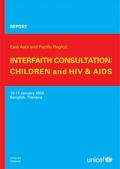
Resource | Publications,
The UNICEF East Asia and Pacific Region Interfaith Consultation: Children and HIV & AIDS, held from 15-17 January 2008 in Bangkok, Thailand, was aimed at developing an interfaith regional framework to strengthen the role of Faith-Based Organizations (FBOs) in responding to HIV & AIDS and in addressing the needs of children affected by HIV and other vulnerable children.
In addition to providing care and support to those infected and affected by HIV & AIDS, many delegates talked about what they saw as room for an even larger role in prevention. They saw scope for expanding activities in such areas as life skills education and outreach programmes targeting most-at-risk adolescents, especially with many of them already working with children’s classes and youth groups.
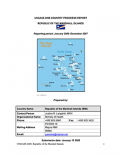
Resource | Publications,
This is an official submission to the UNAIDS secretariat for the monitoring of progress towards the Declaration of Commitment unanimously adopted in the 2001 UN General Assembly Special Session on HIV and AIDS. This report is presented exactly as submitted by the country, without editing or other alteration. This and other member state submissions will form the basis of the Secretary-General’s report to the General Assembly in June as well as the 2008 Report on the Global AIDS Epidemic which will be launched at the International AIDS Conference in August 2008.
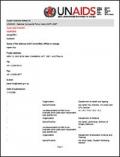
Resource | Publications,
The National Composite Policy Index (NCPI) data submitted by countries was validated for internal consistency and completeness of the response by UNAIDS/Geneva. Illogical values were corrected; countries were contacted in cases of substantial missing data and multiple, non-consolidated NCPI submissions. The PDF files posted contain the validated NCPI data.
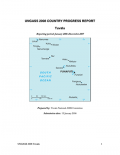
Resource | Publications,
This is an official submission to the UNAIDS secretariat for the monitoring of progress towards the Declaration of Commitment unanimously adopted in the 2001 UN General Assembly Special Session on HIV and AIDS. This report is presented exactly as submitted by the country, without editing or other alteration. This and other member state submissions will form the basis of the Secretary-General’s report to the General Assembly in June as well as the 2008 Report on the Global AIDS Epidemic which will be launched at the International AIDS Conference in August 2008.
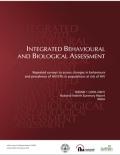
Resource | Publications,
The first round of the Integrated Behavioural and Biological Assessment (IBBA) was implemented in 29 districts in six states, i.e., Andhra Pradesh, Karnataka, Maharashtra, Tamil Nadu, Manipur, and Nagaland. The IBBA was implemented amidst many logistical challenges, including setting up field sites for interviews and medical examinations in areas convenient to high-risk groups, collecting biological specimens in sometimes remote field locations, and transporting specimens to district and state laboratories under cold-chain conditions. This report summarizes the major findings of the first round of the IBBA among FSWs, MSM, Clients, and IDUs.





